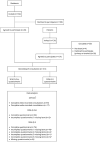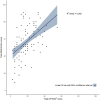Shared decision-making performance of general practice residents: an observational study combining observer, resident, and patient perspectives
- PMID: 38206317
- PMCID: PMC10901472
- DOI: 10.1093/fampra/cmad125
Shared decision-making performance of general practice residents: an observational study combining observer, resident, and patient perspectives
Abstract
Background: Shared decision making (SDM) is considered fundamental to person-centred care. However, applying SDM may be a challenge for residents in general practice, since it is a complex competence that requires the integration of knowledge and skills from several competency domains.
Objective: To support learning of SDM during medical residency, we aimed to gain insight in Dutch residents' observed and perceived SDM performance in general practice.
Methods: We evaluated residents' SDM performance from an observer, resident, and patient perspective. Consultations of first- and third-year residents were recorded. Trained observers used the validated Observing Patient Involvement (OPTION5) scale to assess observed SDM performance of residents in 98 actual recorded consultations. Perceived SDM performance was evaluated by residents and patients completing validated SDM questionnaires, supplemented with questions about (the context of) the consultation and perceived relevance of SDM immediately after the consultation. The data were analysed using descriptive statistics (mean, SD, minimums, and maximums) and explorative bivariate analyses.
Results: The residents' observed mean SDM performance was 19.1 (range, 0-100, SD = 10.9), mean resident self-reported SDM performance was 56.9 (range, 0-100, SD = 18.5), and mean patient-reported SDM performance was 73.3 (range, 0-100, SD = 26.8). We found a significant and positive correlation between observed SDM performance and residents' perceived relevance of SDM for the consultation (t = 4.571, P ≤ 0.001) and the duration of the consultation (r = 0.390, P ≤ 0.001).
Conclusions: This study showed that there is room for increasing awareness of the potential incongruence between observed and perceived SDM performance during medical residency, in order to facilitate the implementation of SDM in clinical practice.
Keywords: decision making; education; general practice; graduate; medical; observational study; patient involvement; patient-centred care; shared.
Plain language summary
The problem: Shared decision making is an important process in which healthcare professional and patient work together to reach a decision on how to solve a health problem. This decision should include patients’ needs and what matters most to them. We investigated if consultations between general practitioners in training (i.e. residents) and their patients demonstrate shared decision making. The research methods: We asked the residents and patients to respond to questions on their experience of shared decision making right after the consultation. We recorded 98 consultations of residents with their patients. Two researchers rated to what extent residents demonstrated shared decision-making behaviours during these consultations.
The results: The patients reported more shared decision making than the residents (patients: 73 versus residents: 57 on a 0–100 scale). The researchers observed low levels of SDM during the consultations (19 on a 0–100 scale). Our conclusion: Residents should be aware that shared decision making does not yet frequently occur in practice. To improve the extent to which residents share decisions with their patients in general practice, residents should learn why, when, and how to involve patients in decision making during consultations.
© The Author(s) 2024. Published by Oxford University Press.
Conflict of interest statement
None.
Figures


Similar articles
-
Toward shared decision making: using the OPTION scale to analyze resident-patient consultations in family medicine.Acad Med. 2011 Aug;86(8):1010-8. doi: 10.1097/ACM.0b013e31822220c5. Acad Med. 2011. PMID: 21694569
-
Identifying residents' educational needs to optimising postgraduate medical education about shared decision-making.Patient Educ Couns. 2022 Oct;105(10):3086-3095. doi: 10.1016/j.pec.2022.06.016. Epub 2022 Jun 27. Patient Educ Couns. 2022. PMID: 35810045
-
Observer Ratings of Shared Decision Making Do Not Match Patient Reports: An Observational Study in 5 Family Medicine Practices.Med Decis Making. 2021 Jan;41(1):51-59. doi: 10.1177/0272989X20977885. Med Decis Making. 2021. PMID: 33371802
-
Conceptual understanding and applicability of shared decision-making in psychiatric care: An integrative review.J Psychiatr Ment Health Nurs. 2021 Aug;28(4):531-548. doi: 10.1111/jpm.12712. Epub 2020 Nov 29. J Psychiatr Ment Health Nurs. 2021. PMID: 33191536 Review.
-
Perceptions of shared decision-making in severe mental illness: An integrative review.J Psychiatr Ment Health Nurs. 2020 Apr;27(2):103-127. doi: 10.1111/jpm.12558. Epub 2019 Dec 6. J Psychiatr Ment Health Nurs. 2020. PMID: 31444919
Cited by
-
A guideline-based preference elicitation tool to enhance shared decision-making in supervised exercise therapy for patients with intermittent claudication: a process evaluation.Ann Med. 2025 Dec;57(1):2540022. doi: 10.1080/07853890.2025.2540022. Epub 2025 Aug 4. Ann Med. 2025. PMID: 40758610 Free PMC article.
-
Connecting knowledge and practice: specialization course in dentistry in public health at Brazilian unified health system - a journey of transformative integration.BMC Med Educ. 2025 Mar 21;25(1):419. doi: 10.1186/s12909-025-06987-1. BMC Med Educ. 2025. PMID: 40119396 Free PMC article.
References
-
- Allen J, Gay B, Crebolder H, Heyrman J, Svab I, Ram P.. The European definition of general practice/family medicine. Ljubljana: WONCA Europe; 2011.
-
- Stiggelbout AM, Van der Weijden T, De Wit MP, Frosch D, Légaré F, Montori VM, Trevena L, Elwyn G.. Shared decision making: really putting patients at the centre of healthcare. BMJ. 2012:344:e256. - PubMed
-
- Hoffmann TC, Montori VM, Del Mar C.. The connection between evidence-based medicine and shared decision making. JAMA. 2014:312(13):1295–1296. - PubMed

